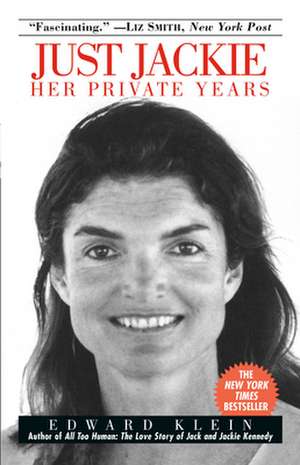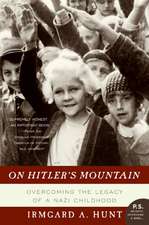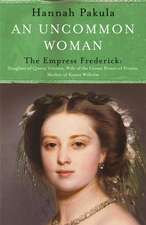Just Jackie: Her Private Years
Autor Edward Kleinen Limba Engleză Paperback – 30 sep 1999
Now, in this carefully detailed chronicle, Edward Klein, the former editor in chief of The New York Times Magazine, bestselling author of All Too Human: The Love Story of Jack and Jackie Kennedy, and friend of Jacqueline Kennedy Onassis for many years, tells the story of Jackie's best years as it has never been told before, shedding an entire new light on her enduring legacy.
Edward Klein has amassed a wealth of exclusive information from private documents and correspondence, FBI files, and hundreds of interviews with Jackie's friends, the associates of her second husband, Greek shipping tycoon Aristotle Onassis, and her longtime lover, the mysterious diamond merchant Maurice Templesman. In this extraordinary, myth-shattering book, many people break their silence for the first time, answering dozens of provocative questions:
¸ Why did Jackie marry Onassis? Was it only for the money?
¸ How did she react when Onassis resumed his affair with Maria Callas?
¸ What was the real reason their marriage fell apart?
¸ When Jackie returned to New York, how did she rebuild her future on a tarnished and clouded past?
¸ When did Maurice Templesman enter her life, and what role did he play in helping Jackie build her fortune?
¸ How did Jackie spend her time during those very private New York years?
Much more than a portrait of a famous celebrity, Edward Klein's work captures the essence of a captivating woman whose passion for wealth was matched only by her deep need for privacy. In Just Jackie, Klein reveals for the first time how Jacqueline Kennedy Onassis finally found the love and contentment she was searching for all her life.
From the Hardcover edition.
Preț: 141.34 lei
Nou
Puncte Express: 212
Preț estimativ în valută:
27.05€ • 29.40$ • 22.74£
27.05€ • 29.40$ • 22.74£
Carte disponibilă
Livrare economică 31 martie-14 aprilie
Preluare comenzi: 021 569.72.76
Specificații
ISBN-13: 9780345490322
ISBN-10: 0345490320
Pagini: 436
Dimensiuni: 140 x 216 x 25 mm
Greutate: 0.55 kg
Editura: Ballantine
ISBN-10: 0345490320
Pagini: 436
Dimensiuni: 140 x 216 x 25 mm
Greutate: 0.55 kg
Editura: Ballantine
Notă biografică
Edward Klein is a well-known writer with a distinguished career in American journalism. He is the author of the New York Times bestseller All Too Human: The Love Story of Jack and Jackie Kennedy. He covered John F. Kennedy's 1960 presidential campaign, served as a foreign correspondent in Asia, and was foreign editor of Newsweek. During his eleven years as editor in chief of The New York Times Magazine, it won the first Pulitzer Prize in its history. His articles have appeared in New York and Parade, and he contributes regularly to Vanity Fair. He is also the author of the novel The Parachutists. He lives with his wife, Dolores Barrett, in New York City and Bridgehampton, Long Island.
From the Paperback edition.
From the Paperback edition.
Extras
A giant thunderbolt split open the night sky, and in the shuddering light a
car emerged from a swirl of fog and raced on through the storm. Slumped in
the backseat was the journalist Theodore White, a stubby little man in his
late forties with thinning hair and an owlish expression. He took a slug
from a plastic bottle that contained a decanted pint of Scotch whisky--his
self-imposed allotment of alcohol for the long hours that lay ahead.
There was another huge flash of lightning, followed this time by a thumping
crash of thunder. White peered out the window at the flooded stretch of
highway. It was coming down in solid sheets of water, just the way it had
rained a week ago on the night President Kennedy's body was brought back
from Dallas in a dark bronze coffin.
White had covered the assassination and the three-day pageant of Kennedy's
funeral for Life magazine. He was still physically exhausted and
emotionally drained from the experience. Now, however, he found himself in
a rented limousine, with a strange chauffeur, driving at break-neck speed
through an old-fashioned northeaster on his way to another assignment for
Life.
"There is something I want Life magazine to say to the country," the
President's widow, Jacqueline Kennedy, had told White during a brief phone
conversation from her home on Cape Cod, "and you must do it."
White did not know what Jackie had in mind, but he could guess why she had
chosen him above all other journalists to carry her message to the American
people. He was the author of The Making of the President 1960, a
book that had caught the mood and the strains of the election campaign, and
that helped give birth to the myth of John Fitzgerald Kennedy. Jackie had
selected White because he was a storyteller with a talent for hero worship.
The limousine slowed down as it approached the summer resort town of
Hyannis on Nantucket Sound. The board of selectmen of Barnstable Township
had decked the facade of the town hall with black crepe in memory of the
dead President, but the merchants had strung up colored Christmas lights
along Main Street in an effort to dispel the gloom. White tossed down
another stiff slug of Scotch and instructed the chauffeur to stop at a gas
station. He got out, ducked into a telephone booth, and placed a call to
New York City.
"How's my mother doing?" he asked.
The thunder and pelting rain drowned out the reply.
"What?" White shouted. "I can't hear you.
"She's doing as well as can be expected," Dr. Harold Ritkin, his family
physician, yelled back into the phone.
White's mother was gravely ill. It was she who had answered the telephone
at her son's East Side town house in Manhattan when Jackie called from the
Cape, and in all the excitement, the old woman began having a heart attack.
White was forced to make a hard decision: stay with his mother, or answer
Jackie's call.
On the phone, Jackie had not spoken to White in her tiny, whispery voice.
She had used her other voice, the one rarely heard by strangers, the deep,
expressive vibrato that she employed when she refused to take no for an
answer. You must do it, she had told White, and he felt compelled to heed
her summons. He chose Jackie over his mother, and drove off into the
raging storm.
He was afflicted by pangs of guilt as his car pulled up to a checkpoint in
front of the Kennedy compound in Hyannis Port. It was not quite
eight-thirty on Friday, November 29,1963. The presidential flag,
illuminated by floodlights and tugged by the wind, was flying in the front
yard of John and Jacqueline Kennedy's rented summer house on nearby Squaw
Island.
The place was crawling with Secret Service men. No one knew if the
assassination had been part of a larger conspiracy, or whether a plot
existed to murder Jackie and her young children, too. Two agents, dressed
in water-stained trench coats and dripping fedoras, shone flashlights into
White's face, then waved him through an opening in the barricade.
The car crunched up the long driveway, past broad lawns that swept down to
the gray, restless waters of Nantucket Sound. White took another snort of
Scotch, cupped a hand over his mouth to check the smell on his breath, and
climbed out of the limousine into the pouring rain. He dashed up the steps
to the big veranda that wrapped around the white clapboard house belonging
to Joseph P. Kennedy Sr., the family patriarch.
He knocked on the door and a maid ushered him into the first-floor parlor,
which was filled with comfortable stuffed furniture. In the room he
spotted a number of familiar faces--Dave Powers, the President's political
crony; Chuck Spalding, Jack's classmate at Harvard; Pat Lawford, the
President's sister; Franklin D. Roosevelt Jr.; and Clint Hill, the agent in
charge of Jackie's Secret Service detail. They greeted him with a chorus
of friendly hellos, followed by polite inquiries about his mother.
He placed another call to New York City from the phone in the hallway, and
while he waited for the long distance operator to connect him to Dr Rilkin,
he snuck another nip from his plastic bottle. He caught sight of himself
in a mirror. His pale and frantic face was glistening with perspiration.
His mind reeled with what seemed like a thousand thoughts. The editors of
Life were holding the magazine's giant presses for him at a cost of $30,000
an hour He must notify them as soon as possible about what Jackie had to
say. His contract with Life called for him to be paid $5,000 for long
pieces and $1,500 for so-called white-fang pieces-stories that could be
done in one quick bite. He wondered whether his editors would try to pay
him the lower rate for tonight's work.
"There's no change in your mother's condition," Dr. Rifkin informed him.
White put down the phone just as Jackie entered the room.
Out of the dozens of hours of funeral coverage that White had watched on
television and events he had witnessed in person, he retained a few
indelible images of Jackie: her swollen eyes behind the sheer veil, her sad
black stockings, her firm, long stride as she marched behind the
caparisoned horse and the President's catafalque on the way to St.
Matthew's Cathedral. Jackie's flawless performance during the President's
funeral had transformed her in the eyes of the public into a kind of
paragon of virtue, practically a saint, and White half expected to find her
here in Hyannis Port still dressed in mourning.
Instead she was turned out in trim black slacks, tapered at the ankles, and
a beige pullover sweater. Even in flat shoes, she looked taller than White
remembered. This impression of height was enhanced by her long, graceful
neck, broad shoulders, and slim hips. Everything about her, even her
hands, seemed slightly out of proportion, yet somehow absolutely right.
She had not bothered to fix her hair. It was tucked casually behind her
ears, exposing the broad contours of her face with its high cheekbones and
full, voluptuous mouth. Without eyeliner or mascara, her eyes seemed to be
set even wider apart than they appeared in photos. But that was not what
made them look different, White decided. It was their color. They were
darker than before. Tragedy had both darkened and deepened her beauty.
"Oh, Teddy," she said, "you came all the way up here in the storm just for
me."
He was suddenly stone-cold sober.
His fatigue, his anxiety over Life's idle presses, his concern over his
fee--all these worries left him in an instant. Even the guilt about his
mother evaporated without a trace. The storyteller in White took over, and
he thought: A talk with Mary Todd Lincoln a week after Lincoln's
assassination wouldn't have been nearly as compelling as this.
From the Hardcover edition.
car emerged from a swirl of fog and raced on through the storm. Slumped in
the backseat was the journalist Theodore White, a stubby little man in his
late forties with thinning hair and an owlish expression. He took a slug
from a plastic bottle that contained a decanted pint of Scotch whisky--his
self-imposed allotment of alcohol for the long hours that lay ahead.
There was another huge flash of lightning, followed this time by a thumping
crash of thunder. White peered out the window at the flooded stretch of
highway. It was coming down in solid sheets of water, just the way it had
rained a week ago on the night President Kennedy's body was brought back
from Dallas in a dark bronze coffin.
White had covered the assassination and the three-day pageant of Kennedy's
funeral for Life magazine. He was still physically exhausted and
emotionally drained from the experience. Now, however, he found himself in
a rented limousine, with a strange chauffeur, driving at break-neck speed
through an old-fashioned northeaster on his way to another assignment for
Life.
"There is something I want Life magazine to say to the country," the
President's widow, Jacqueline Kennedy, had told White during a brief phone
conversation from her home on Cape Cod, "and you must do it."
White did not know what Jackie had in mind, but he could guess why she had
chosen him above all other journalists to carry her message to the American
people. He was the author of The Making of the President 1960, a
book that had caught the mood and the strains of the election campaign, and
that helped give birth to the myth of John Fitzgerald Kennedy. Jackie had
selected White because he was a storyteller with a talent for hero worship.
The limousine slowed down as it approached the summer resort town of
Hyannis on Nantucket Sound. The board of selectmen of Barnstable Township
had decked the facade of the town hall with black crepe in memory of the
dead President, but the merchants had strung up colored Christmas lights
along Main Street in an effort to dispel the gloom. White tossed down
another stiff slug of Scotch and instructed the chauffeur to stop at a gas
station. He got out, ducked into a telephone booth, and placed a call to
New York City.
"How's my mother doing?" he asked.
The thunder and pelting rain drowned out the reply.
"What?" White shouted. "I can't hear you.
"She's doing as well as can be expected," Dr. Harold Ritkin, his family
physician, yelled back into the phone.
White's mother was gravely ill. It was she who had answered the telephone
at her son's East Side town house in Manhattan when Jackie called from the
Cape, and in all the excitement, the old woman began having a heart attack.
White was forced to make a hard decision: stay with his mother, or answer
Jackie's call.
On the phone, Jackie had not spoken to White in her tiny, whispery voice.
She had used her other voice, the one rarely heard by strangers, the deep,
expressive vibrato that she employed when she refused to take no for an
answer. You must do it, she had told White, and he felt compelled to heed
her summons. He chose Jackie over his mother, and drove off into the
raging storm.
He was afflicted by pangs of guilt as his car pulled up to a checkpoint in
front of the Kennedy compound in Hyannis Port. It was not quite
eight-thirty on Friday, November 29,1963. The presidential flag,
illuminated by floodlights and tugged by the wind, was flying in the front
yard of John and Jacqueline Kennedy's rented summer house on nearby Squaw
Island.
The place was crawling with Secret Service men. No one knew if the
assassination had been part of a larger conspiracy, or whether a plot
existed to murder Jackie and her young children, too. Two agents, dressed
in water-stained trench coats and dripping fedoras, shone flashlights into
White's face, then waved him through an opening in the barricade.
The car crunched up the long driveway, past broad lawns that swept down to
the gray, restless waters of Nantucket Sound. White took another snort of
Scotch, cupped a hand over his mouth to check the smell on his breath, and
climbed out of the limousine into the pouring rain. He dashed up the steps
to the big veranda that wrapped around the white clapboard house belonging
to Joseph P. Kennedy Sr., the family patriarch.
He knocked on the door and a maid ushered him into the first-floor parlor,
which was filled with comfortable stuffed furniture. In the room he
spotted a number of familiar faces--Dave Powers, the President's political
crony; Chuck Spalding, Jack's classmate at Harvard; Pat Lawford, the
President's sister; Franklin D. Roosevelt Jr.; and Clint Hill, the agent in
charge of Jackie's Secret Service detail. They greeted him with a chorus
of friendly hellos, followed by polite inquiries about his mother.
He placed another call to New York City from the phone in the hallway, and
while he waited for the long distance operator to connect him to Dr Rilkin,
he snuck another nip from his plastic bottle. He caught sight of himself
in a mirror. His pale and frantic face was glistening with perspiration.
His mind reeled with what seemed like a thousand thoughts. The editors of
Life were holding the magazine's giant presses for him at a cost of $30,000
an hour He must notify them as soon as possible about what Jackie had to
say. His contract with Life called for him to be paid $5,000 for long
pieces and $1,500 for so-called white-fang pieces-stories that could be
done in one quick bite. He wondered whether his editors would try to pay
him the lower rate for tonight's work.
"There's no change in your mother's condition," Dr. Rifkin informed him.
White put down the phone just as Jackie entered the room.
Out of the dozens of hours of funeral coverage that White had watched on
television and events he had witnessed in person, he retained a few
indelible images of Jackie: her swollen eyes behind the sheer veil, her sad
black stockings, her firm, long stride as she marched behind the
caparisoned horse and the President's catafalque on the way to St.
Matthew's Cathedral. Jackie's flawless performance during the President's
funeral had transformed her in the eyes of the public into a kind of
paragon of virtue, practically a saint, and White half expected to find her
here in Hyannis Port still dressed in mourning.
Instead she was turned out in trim black slacks, tapered at the ankles, and
a beige pullover sweater. Even in flat shoes, she looked taller than White
remembered. This impression of height was enhanced by her long, graceful
neck, broad shoulders, and slim hips. Everything about her, even her
hands, seemed slightly out of proportion, yet somehow absolutely right.
She had not bothered to fix her hair. It was tucked casually behind her
ears, exposing the broad contours of her face with its high cheekbones and
full, voluptuous mouth. Without eyeliner or mascara, her eyes seemed to be
set even wider apart than they appeared in photos. But that was not what
made them look different, White decided. It was their color. They were
darker than before. Tragedy had both darkened and deepened her beauty.
"Oh, Teddy," she said, "you came all the way up here in the storm just for
me."
He was suddenly stone-cold sober.
His fatigue, his anxiety over Life's idle presses, his concern over his
fee--all these worries left him in an instant. Even the guilt about his
mother evaporated without a trace. The storyteller in White took over, and
he thought: A talk with Mary Todd Lincoln a week after Lincoln's
assassination wouldn't have been nearly as compelling as this.
From the Hardcover edition.
Recenzii
"Fascinating."
--LIZ SMITH
New York Post
"REVEAL[S] FASCINATING TIDBITS THAT MAY HELP SET THE RECORD STRAIGHT ABOUT ONE OF THE 20TH CENTURY'S MOST FASCINATING WOMEN."
--Houston Chronicle
"STARTLING AND TERRIFIC . . . [KLEIN] CLEARLY WAS ABLE TO TAP SOME OF THOSE WHO WERE IN HER CLOSEST CIRCLE."
--Minneapolis Star Tribune
From the Paperback edition.
--LIZ SMITH
New York Post
"REVEAL[S] FASCINATING TIDBITS THAT MAY HELP SET THE RECORD STRAIGHT ABOUT ONE OF THE 20TH CENTURY'S MOST FASCINATING WOMEN."
--Houston Chronicle
"STARTLING AND TERRIFIC . . . [KLEIN] CLEARLY WAS ABLE TO TAP SOME OF THOSE WHO WERE IN HER CLOSEST CIRCLE."
--Minneapolis Star Tribune
From the Paperback edition.
Textul de pe ultima copertă
In this journalistic tour de force, bestselling author Edward Klein, a friend of Jacqueline Onassis's for many years, takes us behind the public image to give us a story that has never been told before. For this myth-shattering portrait, Klein has amassed a wealth of exclusive information from private documents and correspondence; FBI files; and hundreds of interviews with Jackie's friends, the associates of Aristotle Onassis, and people familiar with her longtime companion, the mysterious diamond merchant Maurice Tempelsman. Many people break their silence here for the first time.
Much more than a portrait of a famous celebrity, JUST JACKIE: HER PRIVATE YEARS captures the essence of a captivating woman whose passion for wealth was matched only by her deep need for privacy.
Descriere
Scores of people who knew Jacqueline Kennedy Onassis but were reluctant to speak out while she was still alive gave remarkable access to Klein for this vivid personal portrait of a Jackie most people never knew. Narrated in a series of short cinematic scenes, the book has an almost novelistic feel. Klein's previous book was "All Too Human." photo insert.









